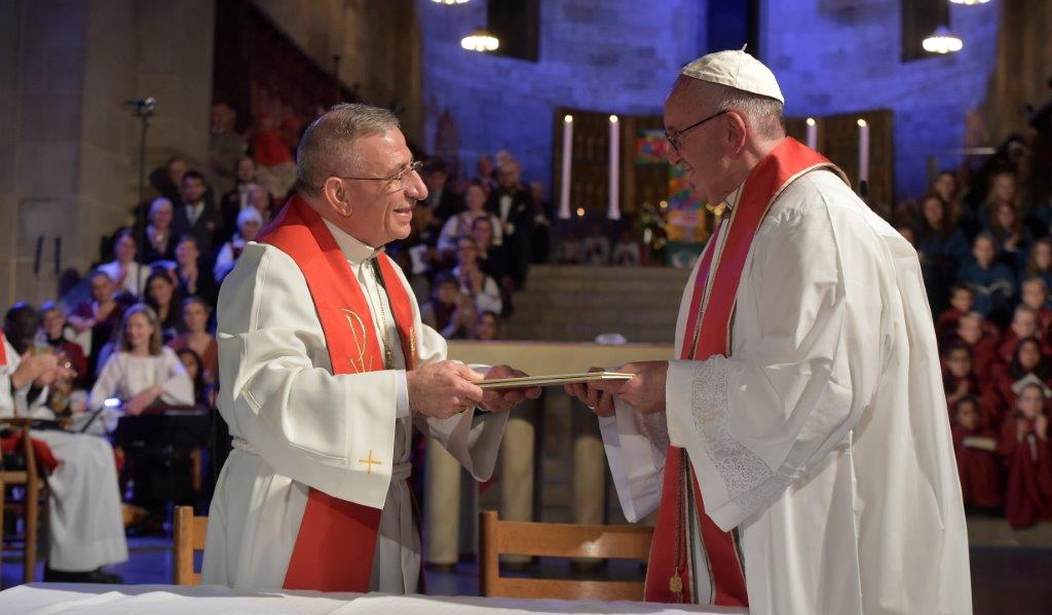Unity sometimes grows agonizingly slowly, and in small increments.
But it does, or can, indeed grow.
The Pope last week was en route to a ceremony launching a year-long commemoration of next October’s 500th anniversary of Martin Luther’s famous “95 Theses” that began the Protestant Reformation. I wrote that the Pope’s participation would, at one point in church history, have boggled the mind, but that 50 years of ecumenical dialogue had made relations between Catholics and at least several Protestant denominations much more cordial.
As it turned out, the Pope and Lutheran Bishop Munib Younan signed a new declaration announcing a “common journey of reconciliation.”
On one level, the declaration was a rather vague, ethereal thing, not at all immune to clichés: “What unites us is greater than what divides us.” “God summons us to be close to all those who yearn for dignity, justice, peace and reconciliation.” And so on.
The statement certainly did not delve into the deep theology of the Joint Declaration on the Doctrine of Justification officially signed by Catholics and Lutherans in 1999 and agreed to by Methodists in 2006. In that somewhat lengthy accord, the central dispute that led Luther to split from the Catholic Church was finally (mostly) resolved, and summed up thusly: “Together we confess: By grace alone, in faith in Christ’s saving work and not because of any merit on our part, we are accepted by God and receive the Holy Spirit, who renews our hearts while equipping and calling us to good works.”
And, in truth, this week’s declaration broke no major new ground. In fact, in some ways its most notable passage was the only one that explicitly acknowledged the remaining divide between the churches – namely, that Protestants and Catholics still cannot “receive the Eucharist at one table, as the concrete expression of full unity … We long for this wound in the Body of Christ to be healed.”
So if there is still no common Eucharist, and if much of the rest of the new declaration contained little more than glittering generalities (albeit warm and welcome ones), then what was the point of signing a formal declaration – rather than just letting homilies and press releases speak to the basic, fuzzy-feel-good-ism that seemed to be the prevailing sentiment?
Perhaps the answer comes in one brief sentence toward the end of the declaration: “As we recommit ourselves to move from conflict to communion, we do so as part of the one Body of Christ, into which we are incorporated through Baptism [my emphasis added].” This is significant (although not entirely new). For nearly five centuries, Catholics had not even accepted Protestant Baptisms as being valid. But in 2013, in another landmark accord of great doctrinal significance, the churches all jointly recognized most Baptisms as being valid incorporations of the newly baptized into the Body of Christ.
To again restate (and thus reinforce) this understanding is important, especially in this new context. It is one thing to co-recognize christenings in general – but to do so while actually commemorating the event that split the church 499 years ago is to provide an emphasis, and even a drama, that pounds home the message, to all Christian believers, that full unity comes ever closer, and that the circle broken all those centuries ago is ever-nearer to being lovingly closed.
What the Pope and the Lutheran bishop did was to signal that the 1999 accord and the 2013 co-recognition of Baptisms should be seen not as grudging, “eat-your-spinach” doctrinal treaties, but as occasions for great celebration.
As is stated at the start of the final paragraph of this week’s declaration, “We call upon all Lutheran and Catholic parishes and communities to be bold and creative, joyful and hopeful [my emphasis again added] in their commitment to continue the great journey ahead of us. Rather than conflicts of the past, God’s gift of unity among us shall guide cooperation and deepen our solidarity.”
These growing accords aren’t merely a dutiful formality; they are occasions for joy.
The new declaration came on the eve of All Saints Day, so perhaps the Revised Common Lectionary Psalm (149) appointed for All Saints is appropriate: “Let Israel be glad in its Maker; let the children of Zion rejoice in their King. Let them praise his name with dancing, making melody to him with tambourine and lyre. For the LORD takes pleasure in his people; he adorns the humble with victory. Let the faithful exult in glory; let them sing for joy on their couches.”
Sing with joy indeed – joy for the blessings of a loving God upon a people united in the hope and promise of His kingdom.
Quin Hillyer is a veteran conservative columnist. He has an undergraduate degree in Theology from Georgetown University and has served for years in various forms of ecumenical lay leadership.









Join the conversation as a VIP Member